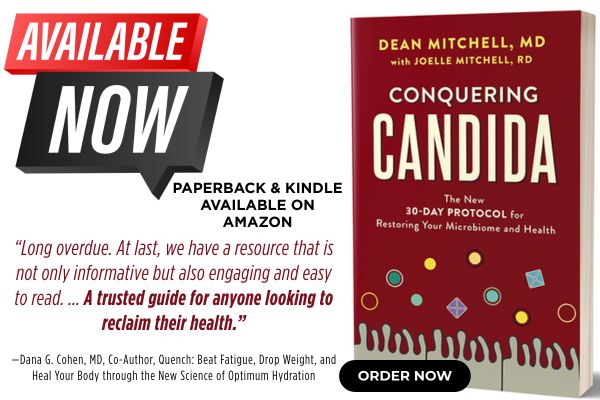What Is Candida Brain Fog and How Is It Treated?
CONNECT WITH US:
Why Candida Brain Fog Happens, How It Disrupts Your Life, and What You Can Do to Clear It
[updated November 2025]
If you’ve ever sat in a meeting and felt your mind completely stall . . .
If you read the same sentence three times and still can’t absorb it . . .
If you sometimes feel slightly “buzzed” or off-balance after eating a carb-heavy meal – yet you don’t drink . . .
If you’ve ever walked into a room and forgotten why you went there, stared at a sentence three times before it made sense, or felt mentally “drunk” without touching alcohol, you already know how frightening brain fog can be. Many of my patients describe it as if someone dimmed the lights inside their mind.
You’re not crazy, and you’re not weak. You may be living with something medicine has ignored for decades: Candida overgrowth and small intestinal fungal overgrowth (SIFO) causing brain fog.
For years, candida was only taken seriously in very sick patients – people with AIDS, leukemia, or on chemotherapy. If you were otherwise “healthy” and complained of fatigue, bloating, recurring yeast infections, or mental fogginess, you were often told it was anxiety, stress, or “in your head.”
My experience in practice – and the work of pioneers like Dr. William Crook, Dr. Mark Pimental, and Dr. Satish Rao – tells a different story. In Conquering Candida, I wrote:
“Candida overgrowth is not an invasive infection. It occurs when the yeast that normally lives peacefully in the body multiples and triggers inflammation.”
Most people have heard of candida because of vaginal yeast infections or digestive issues. Far fewer realize that this same organism can generate toxins capable of clouding memory, slowing processing speed, and weakening concentration. In Conquering Candida, I explain it this way:
“Candida isn’t just a gut issue – it’s a microbiome disruptor that can influence almost every system in the body, including the brain.”
That’s right, the inflammation doesn’t stay in the gut. It can spread to your joints, skins, sinuses, and yes – your brain.
Today, yeast overgrowth affects millions. It is a quiet pandemic that hides behind symptoms most doctors never connect. Brain fog is one of its most misunderstood effects – and one that can absolutely improve when you address the underlying imbalance.
Let’s break down why it happens, how to recognize it, and what you can do to reclaim your clarity. My goal is simple: help you finally understand what’s happening and show you there is a clear, treatable path forward.
What is Candida Overgrowth, Really?
Candida is a single-cell fungus, not a bacterium. In small amounts, it lives peacefully on the skin, in the mouth, vagina, and intestines. In that role, it’s part of a normal microbiome. The problem begins when something disturbs that balance.
Antibiotics, acid-suppressing medications, steroids, birth-control pills, high-sugar diets, chronic stress – each of these can knock down protective bacteria and give yeast the upper hand. As I explain in Conquering Candida,
“The key to understanding Candida overgrowth is a microbiome imbalance, not a rogue invader that appears out of nowhere.”
When that imbalance becomes significant, candida shifts from quiet resident to opportunistic troublemaker. It starts producing mycotoxins, irritating the gut lining and setting off inflammation locally – and in some cases, throughout the body.
That’s why candida can cause:
- vaginal yeast infections
- digestive problems
- rashes
- sinus trouble
- fatigue
- brain fog
To put it bluntly, candida overgrowth and mycotoxins can attack any organ in the body. Brain function is no exception.
What Exactly Is Candida Brain Fog?
When Candida albicans grows beyond its normal limits, it stops behaving like a harmless yeast and begins acting like an opportunistic pathogen. It can produce mycotoxins – chemical byproducts that irritate tissue, weaken immunity, and interfere with normal neurological function. One of the most troublesome toxins is acetaldehyde.
Here’s the sequence I see repeatedly in practice:
- candida overgrows
- it ferments carbohydrates and produces acetaldehyde
- the liver tries to process it
- when overwhelmed, the toxin spills into circulation
- the toxin crosses into the brain, dulling cognitive function and affecting balance
Acetaldehyde also drains thiamine (vitamin B1). Thiamine is essential for healthy nerve function and helps produce acetylcholine, one of the brain’s key neurotransmitters for memory and focus. Without enough thiamine, thinking slows down dramatically.
Brain fog does more than adversely affect the ability to perform well at work or school; it impacts your ability to comfortably live inside your own mind.
What Candida Brain Fog Feels Like (It’s Not Regular Tiredness)
Brain fog from candida doesn’t feel like mild tiredness. It’s far more intrusive. Anyone who’s had candida-related brain fog knows this isn’t simple fatigue or mild distractibility.
Patients describe it as:
- “I process information very slowly”
- “my brain stalls after every thought”
- “it takes forever to process simple tasks”
- “everything feels muffled”
- “I lose words mid-sentence”
- “my thinking feels cloudy and sluggish”
- “I feel intoxicated even though I don’t drink”
This level of fog can:
- damage your performance at work or school
- strain relationships
- undermine confidence
- make everyday decisions feel exhausting
It affects your work, relationships, and sense of self.
From a neurological standpoint, candida brain fog happens when inflammation and toxins interfere with neurons’ ability to “talk” to each other. The signal slows. Thought feels heavy.
One of the worst offenders is acetaldehyde, a toxic byproduct made when yeast ferments carbohydrates. Your liver can neutralize some acetaldehyde, but when yeast grows out of control, production overwhelms detoxification. At that point, acetaldehyde spills into the bloodstream, crosses the blood-brain barrier, and causes:
- foggy thinking
- vertigo or loss of equilibrium
- head pressure
- strange “hangover” sensations
- anxiety and mood swings
It also consumes thiamine (vitamin B1), which the brain needs to make acetylcholine – a key neurotransmitter for memory and focus. Deficiencies magnify cognitive slowing.
You can see why this feels so different from simply being tired.
Harvard Health has documented the gut-brain connection in detail: intestinal microbes send signals through nerves, immune cells, and metabolic byproducts, which shape brain function and mood. Candida weaponizes that same highway.
From “Mystery IBS” to Bacterial and Fungal Overgrowth
For many years, irritable bowel syndrome (IBS) was a wastebasket diagnosis. Patients complained of bloating, cramps, constipation, diarrhea, and food intolerances; tests came back “normal;” they were told it was stress or “a nervous stomach.”
Then Dr. Mark Pimental and others showed that small intestinal bacteria overgrowth (SIBO) drives many IBS cases. That was a breakthrough.
Yet a large group of patients still had classic IBS symptoms – plus brain fog – and negative SIBO breath tests.
That’s where Dr. Satish Rao’s work became so important. While doing invasive testing for complex GI cases, he took sterile aspirates from the duodenum and jejunum (upper and mid small intestine). What he found astonished even him:
“We are not talking about ten candida or a hundred candida. We are growing hundreds of thousands of candida in the small intestine.”
In other words, small intestinal fungal overgrowth (SIFO) is real. For many patients with IBS-like symptoms and brain fog, yeast – not bacteria – is the main problem.
In Conquering Candida, I highlight this as one of the most important confirmations of what integrative doctors had seen for decades:
“A compendium of scientific evidence shows that Candida overgrowth is a real condition resulting from an imbalance in the gut microbiome.”
Dr. Rao’s research gave that evidence a hard, measurable foundation.
Your Gut as a “Brewery” – Auto-Brewery Syndrome and the Spectrum of Brain Fog
One of the most dramatic illustrations of yeast overgrowth is auto-brewery syndrome – a condition where the intestines literally ferment carbohydrates into alcohol.
Patients eat high-carb foods, and their blood alcohol levels rise . . . without a single drink.
In my book, I describe it this way:
“Auto-brewery syndrome may sound like science fiction, but for patients, the gut’s ability to turn sugar into alcohol can have very real, life-altering consequences.”
Dr. Rao and other researchers have documented cases where people were pulled over for suspected drunk driving, insisted they didn’t drink, and later turned out to have intestinal fermentation producing ethanol.
Candida brain fog sits on that same spectrum – often less dramatic, but driven by similar chemistry:
- carbs feed yeast
- yeast ferments carbs into toxins and sometimes alcohol-like compounds
- the liver gets overwhelmed
- the brain feels dull, unsteady, or intoxicated
Some patients reach the extreme of auto-brewery. Many more live every day in the milder but miserable zone of chronic cognitive haze.
Triggers: How Modern Life Feeds Candida and SIFO
From both clinical practice and research summarized in Conquering Candida, the most common triggers for candida overgrowth and SIFO include:
- antibiotics (especially long-term or repeated courses for acne, sinus infections, lyme, bronchitis)
- proton pump inhibitors (PPIs) for reflux
- oral corticosteroids and frequent steroid inhalers or creams
- birth-control pills and certain hormone replacement therapies
- high-sugar, high-refined carb diets
- chronic stress
- gluten-heavy, highly-processed wheat products
- constipation and slow gut motility
Dr. Rao’s group found something striking: PPIs and underlying gut dysmotility were two of the biggest risk factors for both SIBO and SIFO.
There’s a clear logic:
- stomach acids act like a gatekeeper, killing microbes in food
- lowering acid with PPIs weakens that barrier
- yeast and bacteria sneak through, survive, colonize the small intestine
Glucose encourages yeast to thrive and fuel systemic inflammation. Sugar and refined carbohydrates are Candida’s favorite food. Conquering Candida also notes:
“Medications, hormonal shifts, and stress can all tilt the microbiome in favor of Candida, especially when combined with a high-carbohydrate diet.”
Modern life conveniently offers all of those at once.
Gluten, Grain Brain, and Candida: Different Paths to the Same Fog
Processed foods are what happened. The bread our ancestors ate thousands of years ago bears no resemblance to the processed bread we have available today. The strain of wheat is even different.
The wheat today is high in gluten and in yeast. This presents problems to my patients that have either candida hypersensitivity or Gluten sensitivity. The biggest revelation of late is that these foods can affect your brain health.
In his book, Grain Brain: The Surprising Truth about Wheat, Carbs, and Sugar–Your Brain’s Silent Killers, Dr. David Perlmutter, a Florida neurologist and frequent guest on The Dr. Oz Show, lays out the case that wheat causes brain problems ranging from Alzheimer’s to strokes. The premise of this is that wheat is inflammatory by affecting your blood sugar and insulin response. He advocates removing wheat completely from your diet to protect your brain.
I agree with him because an even more compelling book, Wheat Belly: Lose the Wheat, Lose the Weight, and Find Your Path Back to Health, by William Davis, cites numerous studies where wheat causes an increase in belly fat, obesity, and diabetes. After reading his book, I could never look at a piece of bread the same way. I have seen in my own practice that patients feel better avoiding wheat and gluten products(barley, rye) with more energy and they seem to be more alert and energetic.
Both argue that modern wheat – higher in gluten, modified, and heavily processed – contributes to inflammation, obesity, and neurologic problems.
Wheat-heavy diets often:
- spike blood sugar
- feed yeast
- fuel SIBO
- increase intestinal permeability (“leaky gut”)
Dr. Alessio Fasano’s work on celiac disease and zonulin showed that gluten can open tight junctions in the intestine, allowing antigens and toxins to enter the bloodstream. That same mechanism can help yeast-drived toxins spread more easily.
So while gluten itself can inflame the brain through immune pathways, it also feeds and amplifies fungal overgrowth in many susceptible individuals. In practice, I see patients improve mental clarity by:
- reducing or eliminating wheat
- lowering total sugar and starch intake
- addressing yeast directly with antifungals
It’s rarely just one factor. The problem is the combination.
Why Probiotics Sometimes Make Brain Fog Worse
One of the most fascinating parts of my conversation with Dr. Rao was his research linking probiotics to brain fog in some patients.
In his study:
- patients took probiotics containing lactobacillus
- they reported severe fogginess
- urine testing after a glucose challenge showed elevated D-lactic acid
- treating underlying bacterial and fungal overgrowth, and stopping probiotics, resolved symptoms
His conclusion was blunt, “Probiotics are a big no for many of these patients.”
That doesn’t mean every person should avoid probiotics forever. It does mean that in the wrong context – especially with SIBO or SIFO – they can worsen fermentation and cognitive symptoms instead of helping. This is why I often prefer a food-first, prebiotic-rich approach (vegetables, fiber, low-glycemic fruits) and targeted antifungals, rather than blanket probiotic use for every gut problem.
How We Diagnose Candida Brain Fog
There is no single perfect, simple test for candida brain fog – yet. Dr. Rao and I both believe future breath tests may measure acetaldehyde or ethanol after glucose loads, similar to SIBO testing or alcohol checks.
For now, diagnosis is based on a combination of:
- detailed history – medications, diet, stress, infections, antibiotic use
- symptom pattern – gut issues plus yeast infections, rashes, fog, fatigue
- labs – where useful
- candida antibodies (blood)
- nutrient levels (B12, iron, vitamin D, magnesium)
- urine organic acids
- SIBO breath tests to identify mixed cases
- Response to antifungal treatment and dietary changes
In Conquering Candida, I emphasize that:
“Candida overgrowth can present with a multitude of symptoms, which is why the story is the most important part of the diagnosis.”
That’s why so many doctors miss it. They’re trained to match one symptom to one organ – not a cluster of seemingly unrelated issues that trace back to the microbiome.
A Holistic, Evidence-Informed Plan to Treat Candida Brain Fog
At Mitchell Medical Group, we use a multi-step approach expanded by the research summarized in Conquering Candida and reinforced by experts like Dr. Rao.
1. Antifungal Medication
Diet alone rarely reverses significant overgrowth. Antifungal medications like:
- fluconazole (Diflucan)
- nystatin
- occasionally itraconazole
can dramatically reduce fungal burden when used for adequate durations under medical supervision.
Dr. Rao routinely uses three-week courses of fluconazole, which matches what I see in practice – short “bursts” usually fail. Liver function is monitored, but in thousands of patients I’ve treated, fluconazole has been very well tolerated.
2. The Candida Diet and Blood Sugar Control
The holistic approach typically includes improving one’s management of blood glucose levels, since glucose encourages yeast to thrive.
Dietary goals:
- remove refined sugar
- eliminate or drastically reduce wheat
- avoid alcohol
- skip artificial sweeteners
- limit high-starch carbs
- focus on vegetables, lean protein, healthy fats, and low-glycemic fruits
In Conquering Candida, I stress that this is not about punishment: “the goal is to starve Candida; it’s to feed the microbiome that keeps Candida in check.”
Balancing blood sugar supports your brain, your gut, and your energy.
3. Restoring Nutrient Status
Candida can impair the absorption of:
- vitamin B12
- iron
- magnesium
- vitamin D
Deficiencies in those nutrients worsen fatigue and cognitive problems. In some cases, we use IV vitamin therapy in our NYC office, including glutathione, to speed recovery. The NIH confirms that B12 deficiency can cause neurological changes and cognitive impairment. So part of clearing brain fog is literally refueling your nervous system.
4. Sublingual Immunotherapy (SLIT)
Another powerful tool in restoring long-term balance is sublingual immunotherapy, or SLIT. This treatment works by introducing extremely small, controlled amounts of candida under the tongue, where the immune system can recognize it calmly rather than react aggresssively.
Over time, SLIT helps:
- build immune tolerance
- reduce hypersensitivity to candida
- lower the likelihood of relapse
My background in allergy and immunology is what led me to bring this approach to candida care many years ago. For patients who struggle with chronic, recurring symptoms – especially those who flare after diet slip-ups, stress, antibiotics, or hormonal shifts – SLIT often creates the long-term stability they’ve never been able to achieve through diet and antifungals alone.
It doesn’t replace the need to lower fungal overgrowth initially, but it plays a key role once the gut begins to heal, helping patients maintain clarity, energy, and resilience over time.
Coping with Brain Fog While You Heal
As treatment begins to rebalance the microbiome and lower fungal overgrowth, your clarity will gradually return. Still, brain fog can make everyday life feel harder than it should, and having a few practical strategies can make the healing process far more manageable.
Patients often find it helpful to:
- lighten demanding tasks on days when your mind feels slower or overstimulated
- use lists and reminders to keep track of tasks, appointments, and important details
- carry a small notebook or use your phone’s app so fleeting thoughts don’t slip away
- protect your sleep, since deep rest is when the brain quite literally detoxifies
- break complex responsibilities into smaller steps instead of pushing through all at once
- show yourself patience, especially when symptoms fluctuate from day to day
Healing isn’t linear. Symptoms improve in waves, and your cognitive strength usually returns steadily once the underlying imbalance is corrected. Even small adjustments in daily habits can help you stay grounded as your clarity begins to come back online.
When to Seek Help
You should consider an evaluation for candida overgrowth if you recognize yourself in this list:
- recurring brain fog that disrupts daily life
- bloating, gas, or abdomincal discomfort
- constipation, diarrhea, or alternating patterns
- vaginal yeast infections or jock itch
- sinus congestion or postnasal drip without clear allergy triggers
- intense sugar or carb cravings
- worsening symptoms after PPIs, antibiotics, or steroids
- history of “IBS” with incomplete relief
- feeling better mentally when you skip meals or lower carbs
As Dr. Rao said in the end of our interview: “Don’t give up. If you have persistent gas, bloating, distention, brain fogginess . . . knock on doors. There are ways to diagnose your problem, and more importantly, there are ways to treat and heal it.”
A Path Back to Clarity
I wrote Conquering Candida because as I say in the book: “I felt compelled to write this book because my career in medicine kept bringing me patients nobody else could explain.”
After treating thousands of people with candida overgrowth, SIFO, SIBO, mold toxicity, and complex gut-immune issues, I’ve seen one truth hold up repeatedly:
When you rebalance the microbiome and lower the yeast overload, mental clarity returns.
If you’re tired of feeling foggy, dismissed, or stuck in a body that doesn’t feel like yours, you don’t have to keep guessing.
At Mitchell Medical Group in NYC, we offer:
- comprehensive candida evaluations
- physician-guided antifungal treatment
- individualized dietary plans
- IV vitamin support when needed
- sublingual candida immunotherapy for long-term balance
You deserve to feel sharp, steady, and present again. Your brain is not broken. Your microbiome is asking for help – and with the right approach, the fog can lift. Book a meeting in-person in our NYC office or a telehealth appointment to get started.
Related Articles

About the Author – Dr. Dean Mitchell, M.D.
Dr. Dean Mitchell, M.D. is a Board Certified Allergist and Immunologist based out of NYC. He graduated from the Sackler School of Medicine and completed training at the Robert Cooke Allergy Institute in New York City. He is also a Clinical Assistant Professor at Touro College of Osteopathic Medicine, a fellow of the American Academy of Allergy, Asthma, and Immunology, and the author of Conquering Candida: The New 30-Day Protocol for Restoring Your Microbiome and Health and Dr. Dean Mitchell’s Allergy and Asthma Solution: The Ultimate Program for Reversing Your Symptoms One Drop at a Time. Dr. Dean Mitchell, M.D. has also been featured in The New York Times, The Huffington Post, Fitness Magazine, Dr. Oz, and News NY 1. Dr. Mitchell also hosts the podcast The Smartest Doctor in the Room – a combination of a lively, personal, and in-depth interview with top healthcare specialists.
This site contains affiliate links to products. We may receive a commission for purchases made through these links.
Reference
Boroch, CNC, Ann. “The Candida Cure – Yeast, Fungus and Your Health.” Quintessential Healing Publishing, Inc., 2009.
Candidiasis, Centers for Disease Control and Prevention. https://www.cdc.gov/fungal/diseases/candidiasis/index.html
Candidiasis. Harvard Health Publishing, The Harvard Medical School. https://www.health.harvard.edu/a_to_z/candidiasis-a-to-z





